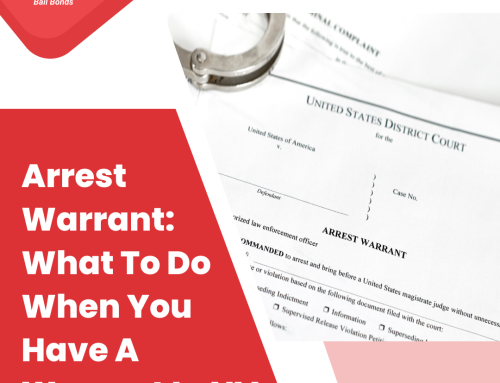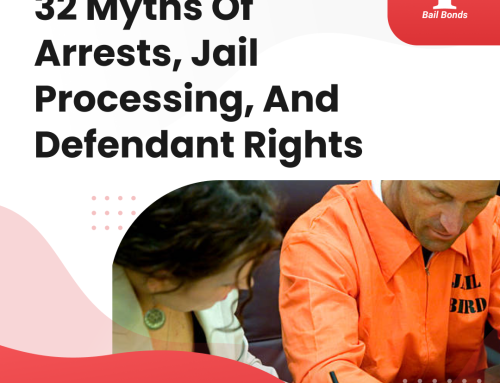- If you want to read our article on how bail bonds work in Las Vegas, check out the link, otherwise stay on this page for our general overview of bail bonds.
- Filling out bail bond paperwork is a necessary part of the bail process, so check out our article to find out what paperwork you’ll need to submit.
- If you’re asking how do bail bonds work when it comes to your public information, take a look at our article Is Bail Bond Information Public Record?
Table of Contents
How Do Bail Bonds Work Answered
What Are The Advantages Of A Bail Bond?
The Answer
Bail bonds work by allowing defendants to pay only a fraction of their full bail amount in the form of a surety bond. In Las Vegas, the premium for a bail bond is set at 15% of the bail amount, which the defendant pays to the bail bond company in exchange for their help.
For example, if bail is set at $1000 and the premium for the bail bond is only 15%, the defendant would only pay $150.
Bail Bond Example
Case: First offense DUI in Nevada
Standard Bail Schedule: $2,000
Bail bond cost: $300
What Are The Advantages Of A Bail Bond?
The two major advantages of bail bonds are (1) they make paying bail much easier than either going deep into your pockets or taking out a loan with a high interest rate, and (2) they get you out of jail and back home quickly.
Another perhaps less prominent advantage (but no less important) is that, in many cases, bail bonds keep you from having to pay for an electronic ankle monitor, which is often quite costly and can easily drive you into debt.
What Is the Process of Posting A Bail Bond?
In Nevada, bail amounts are often predetermined by a standard bail schedule, which can expedite the bail process. If the alleged offense is listed on the bail schedule, you may be able to post bail and be released from custody quickly without the need for a bail hearing.
However, if the offense is not listed on the bail schedule or if there are other factors that require consideration, you will be transferred to a detention facility to await your bail hearing. During this hearing, the judge will determine the bail amount based on the specific circumstances of your case, such as the severity of the alleged offense, your criminal history, and your ties to the community.
Securing a Bail Bond Quickly
To ensure a smooth and efficient release from custody, contact a reputable bail bond agency like All n One Bail Bonds as soon as possible. Our experienced team is available 24/7 to help you navigate the bail process, provide fast bail bonds, and offer flexible payment options.
We want to help you reunite with your family quickly!
How Do Bail Bonds Work – FAQs
If you’re still wondering how bail bonds work, check out the FAQs below.
Q1: What Are Bail Release Conditions In Nevada?
Usually, when a defendant is released from jail, they will be required to continue working at their job, abide by certain travel restrictions, and of course, show up for their court hearings.
Respecting the court’s wishes is the most important thing a defendant can do. Not doing so may result in a bench warrant being issued for their arrest and their losing the ability to stay out of jail until their trial concludes.
Side Note: In a drug-related case, a defendant will likely be required to undergo regular drug testing and even be required to go through rehab.
Q2: What Determines Bail Conditions For A Defendant?
The details of a defendant’s case determine the conditions of their release. The details a judge will look at include:
- The nature and severity of the crime
- The defendant’s criminal history
- If the crime was committed locally
- How long the defendant has lived in the area
- The defendant’s reputation and ties to the local community
- The defendant’s employment history and financial ability
Q3: Where Do You Bail Out Of Jail In Las Vegas?
There are actually four jails in the Las Vegas area:
- Clark County Detention Center (CCDC, but it is also sometimes called the Las Vegas Detention Center)
- Las Vegas Detention Center (Las Vegas City Jail)
- Henderson Detention Center (also doubles as the Las Vegas Immigration Jail)
- North Las Vegas Community Correctional Center (North Las Vegas Detention Center or North Las Vegas CCC or North Las Vegas Jail)
Now that we’ve gotten the names of the jails sorted, here are the specifics of how to bail people out of each one.
Clark County Detention Center (CCDC): You will need to pay bail either at the pre trial services bail bond window OR the Regional Justice Center. Which one you go to depends on whether your case is being handled by the District Court or Justice Court.
Bail for the District Court is paid at the Regional Justice Center, while bail for the Justice Court is paid at the pre-trial services window.
Just a heads up:
The pre-trial bail window is open 24/7, but the Regional Justice Center only accepts bail bond payments from 8 a.m. to 5 p.m.
Personal checks are not accepted at either location.
When submitting a bail bond, please also keep in mind that you’ll need to pay a $50 fee. This fee applies to both courts and is payable through cash, credit card, money order, or cashier’s check.
Las Vegas Detention Center (Las Vegas City Jail): To post bail at Las Vegas City Jail, you’ll need to go to 3200 Stewart Ave., Las Vegas, Nevada, 89101. The jail accepts multiple types of payment for bail bonds, including credit cards. However, American Express is NOT accepted.
Henderson Detention Center (Las Vegas Immigration Jail): To post bail at Henderson Detention Center, you’ll want to go to the Henderson Municipal Court and Henderson Justice Court, both of which are located at 243 Water Street, Henderson, NV 89015.
Both courts have the same hours. 7 am to 5 pm, Monday through Thursday.
If you need to post bail outside available hours, you should go to the bail gate behind the courthouse at S. Texas Ave instead.
North Las Vegas Community Correctional Center (North Las Vegas Jail): To post bail at North Las Vegas Jail, you can either go to the North Las Vegas Municipal Court, which is available Monday through Thursday from 7 am to 5 pm, OR the North Las Vegas CCC, which is available for posting after hours.
North Las Vegas Jail and the municipal court share the same address: 2332 Las Vegas Blvd N.
Please note that ONLY the municipal court accepts cash for cash bail. The jail does not. If you’re looking to use cash, you’ll have to wait until the court is open.
Q4: How Many Types Of Bail Bonds Are There?
There are five main types of bail bonds, which are as follows:
- Surety bail bond
- Cash bond
- Property bond
- Immigration bond
- Personal recognizance bond
Note: Federal bail bonds also exist, but they are quite different from other types of bail bonds, so we haven’t included them in the main list.
Q5: What Are The Different Types Of Bail Bonds?
Here is a summary of the different bail bond types:
Cash Bond
Cash bonds are used when you pay your full bail amount in cash. This is an option that some people choose, although the majority opt against it. The reason why most people don’t use cash bonds is that bail amounts are often very high, averaging around $10,000 in the United States.
This is simply too much for most people to afford.
In fact, according to MarketWatch, “Research from the Federal Reserve found that 4 in 10 Americans couldn’t afford a $400 emergency, and 22% say they expect to forgo payments on some of their bills.”
Now, those who can afford a cash bond can pay with cash, credit card, cashier’s check, or money order.
Surety Bail Bond
If you’re like many Americans and are unable to afford cash bail, fortunately, there is an alternative. You can get a surety bail bond. If you’re confused by the word “surety” here, don’t be. A surety bail bond is just a regular bail bond that you would get from a bail agency.
Surety bail bonds are the most frequently used type of bail bond since they allow defendants to get out of jail quickly without having to put up a huge amount of money. This works because defendants pay their preferred bail agency a premium to post bond for them.
Defendants in Nevada only pay a 15% non-refundable premium, so if your bail amount is $20,000, you’ll need to pay $3,000 to your preferred bail company.
While $3,000 is still a lot of money, many bail bond companies (us included) make it easier to afford by offering you a highly flexible bail bond payment plan designed to fit your budget.
Property Bond
Property bonds are used when you post any type of property with real value, such as a house, commercial building, or land, instead of a bail bond or cash bond.
Personal Recognizance Bond
Getting a personal recognizance bond means that a defendant will be able to get released on O.R. (Own Recognizance), that is, get out of jail for free.
Personal recognizance bonds are usually reserved for misdemeanor cases in which the defendant has a good reputation and an otherwise clean criminal record. Lately, however, policies in Nevada have been changing.
Before getting released on O.R., a defendant is required to sign a document promising to obey the conditions of their release. You might also end up on an ankle monitor in Clark County!
Immigration Bond
An immigration bond is used when an illegal immigrant breaks the law in the US. These bonds work pretty much the same way as other bond types.
Q5: Do You Always Need Collateral?
No, not always.
Some bail agencies are willing to look at individual cases when determining whether or not they want to provide someone with a no-collateral bail bond.
If you are in need of a bail bond but don’t have any collateral, give us a call at (702) 333-2663. We will discuss the specifics of your situation.
Why Work With Us?
It may come as a surprise that a lot of people do not know how bail bonds work. This can be a problem because, without this knowledge, it is impossible to understand how the legal process works in the U.S.
The good news is that All n One Bail Bonds is here to help. We provide easy-to-digest information about bail bonds and the criminal justice system.
If you’re trying to decide what bail bond company to choose, there are a few reasons why All n One Bail Bonds might be the right fit for you.
- The first is that we are a knowledgeable bail bond agency with years of experience helping clients in Las Vegas get fast and affordable bail bonds.
- The second is that we post bonds quickly for you. We understand how important speed is when it comes to getting you or a loved one out of jail.
- The third is that we’re always available. Emergencies can happen at any time, and the last thing you want to happen is not to have anyone to call.
Our availability 24/7 means you don’t have to worry about being left without help. We work hard to be there when it counts and walk you through the entire bail process.
IMPORTANT: Filling out bail bond paperwork is a necessary part of the bail process, so check out our article to find out what paperwork you’ll need to submit. If you’re asking how bail bonds work when it comes to your public information, take a look at our article Is Bail Bond Information Public Record?





